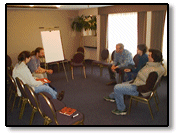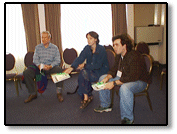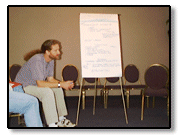 News News |
|
|
|
Students ponder life in a corporate-driven
world
By Georgia Black
Bishops College
St. John's, Newfoundland |

Students and professors discuss corporate
infulence |
Young people attending the annual general meeting of the Council
of Canadians are looking for ways to counter the messages they
get every day from the corporate world.
The Council is a group of people from all across Canada who
challenge the government and corporate power. They work with
organizations throughout the country and around the world to
promote economic justice, to advance alternatives to corporate-style
free trade, to preserve our environment and to assert our Canadian
sovereignty. |
|
At its meeting in St. John's, the COC held numerous workshops
including one called "Beyond McWorld", facilitated
by Rob Altemeyer, a native of Winnipeg. Only six people participated
in the discussion but the diversity of the group brought the
session to life.
Melanie Thomas and Colin MacDonald are studying political
science at Memorial University of Newfoundland (MUN). They said
most high school students haven't come to the realization that
they would have a twenty-five thousand dollar debt after they'd
completed university, and therefore, should be doing something
about it now.
Tony Middleton, a computer science professor at MUN, came
to this workshop because he wanted to know "what students
are up against" and what their impressions of today's world
were. |
|
The group talked a lot about student debt, which was no surprise
due to the presence of a university professor and students and
Laura Coultos, a student at the province's publicly-funded college,
the College of the North Atlantic.
"We're being beaten with the same club," said Middleton,
meaning that it's not just the students who are suffering from
tuition increases and educational cutbacks, it's also the professors
and the staff. He thought that the three groups should form some
sort of Concerned Faculty Council and tackle the common opponent
as one large ensemble. |

Students talk about cuts to education
|
|
The topic of conversation then moved onto partnerships
between big corporations and educational institutions. The liaison
between Bishops College in St. John's and Nortel was mentioned,
praised for its financial benefits to the high school but also
criticized for Nortel's dealings in Burma. The group noted that
many schools were facing the same issues.
"Educational institutions (like MUN) are strapped for
cash so they turn to the corporations for money," said MacDonald.
He's worried that an "unbreakable" dependency was
forming between the two and he was also scared that if corporations
decide to stop funding, then where's the money going to come
from? |

Rob Altemeyer leads the discussion |
Thomas talked about how corporations aren't democratic and
have too much power, and Middleton piped up saying that, "We
vote for people who don't have democratic power."
"If you hear something long enough, you start to believe
it," said Thomas, in regards to corporate slogans, and she
finds that most people welcome these with uncritical acceptance. |
|
So, you may be asking yourselves, are there any solutions?
Of course there are! There are approximately 5.3 billion of them
and that number is increasing daily.
"We underestimate our power," said Thomas about
consumers.
As Rob Altemeyer said, "You vote for your government
every four or five years, but you vote for your future every
time you buy something."
Everyone's opinion was that we need to educate the general
public to support local businesses whenever possible and not
to support the huge industries that don't offer us, as the consumer,
alternatives.
Did you know that the average Canadian watches 23.6 hours
of television per week? That's over three hours a day! So, the
feeling of the group this weekend was to switch the TV off whenever
possible, read a book, ride your bike, walk or use public transportation
instead of taking the car. Remember: it's your choice! |
|